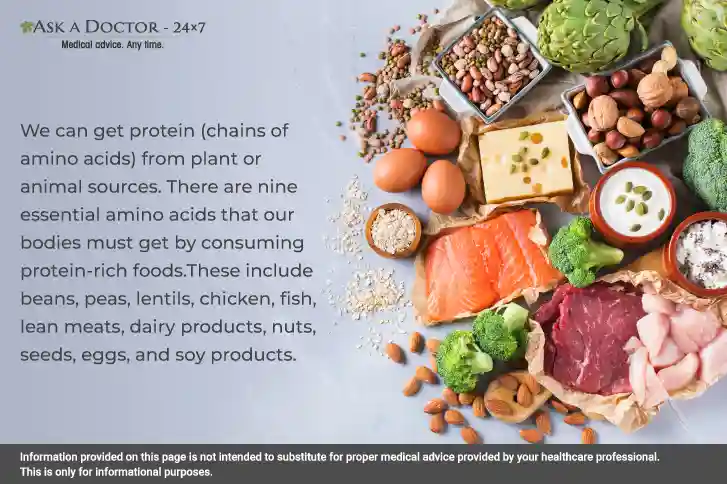Struggling To Gain Weight? Try These 5 Protein-Rich Diets Today
The ideal nutrition approach for acquiring a healthy weight is still eating adequate and appropriate food, regardless of whether you are underweight or exhausted from working out. But making the distinction between good and unhealthy weight gain is crucial. While excessive fat accumulation leads to undesirable weight gain, healthy weight growth happens when the body's muscular mass grows. Protein promotes muscle growth and repair, which helps people.
Protein plays a key role in attaining weight gain in a healthy and balanced way by offering the building blocks required for muscular growth. A healthy weight gain journey that emphasizes muscle growth over body fat accumulation can therefore be achieved by including enough protein in your diet and engaging in a suitable workout regimen. Let’s discuss the top five foods to help you build muscle or gain weight healthily.
How to Eat Protein to Gain Weight?

Protein is one of the key building blocks. Along with fats and carbohydrates, proteins are one of the three essential macronutrients, vital for everyday bodily processes, including tissue growth and repair. One strategy to encourage weight gain is to eat a diet high in protein, particularly when building muscle. Also, by consuming more protein, one can improve bone density, increase muscle mass, and strength.
5 Protein-Rich Diets to Facilitate Weight Gain
The top protein-rich hero foods for weight gain are:
1. Milk
Milk contains all of the elements our bodies need, hence it is regarded as a complete food. Proteins, calcium, carbohydrates, lipids, minerals, and vitamins are abundant in it. Milk contains both casein and whey proteins, making it a great source of protein. Also, milk can help the body gain muscle mass. Try having two glasses of milk with your meal, either before or after working out. You can also consume milk in the form of curd, yoghurt, or buttermilk if you have trouble digesting it.
2. Dried Fruits and Nuts
Eating nuts and dried fruits can help you gain weight. This superfood has a variety of vitamins, proteins, calories, and antioxidants. The naturally high sugar content and good fats in all dried fruit and nuts may contribute to weight gain. They can be eaten raw, roasted, or soaked in water overnight. You can add them to milkshakes, smoothies, and yoghurt. The best way to gain weight is to eat a handful of dried fruits and nuts such as cashews, walnuts, and almonds daily.
3. Homemade Protein Smoothies
Compared to store-bought protein supplements, homemade smoothies are far healthier. The best time to consume a smoothie for muscle growth is shortly after working out. Protein smoothies are healthy, with a lot of flavor and taste good.
Here are a few homemade smoothie recipes that can aid in rapid weight gain:
- Chocolate banana nut shake (banana, nuts of choice, dark chocolate, honey, milk
- Chocolate hazelnut shake (dark chocolate, hazelnut butter, milk)
- Vanilla berry shake (vanilla essence, blueberry, honey, milk)
- Super green shake (matcha powder, avocado, spinach, and milk)
- You can add natural sweeteners like dates, honey, jaggery, agave, etc.
4. Eggs
Eggs are one of the best foods for muscle-building and a great source of high-quality protein. They contain all nine essential amino acids, making them a complete protein source. It's generally advisable to consume the entire egg, including the egg yolk, as it contains important vitamins (A, D, E, and B12). Eggs can be prepared in a variety of ways, such as boiling, poaching, frying, baking, and scrambling. Eggs are nutrient-dense, and for the majority of healthy people, there is no upper limit to how many you should eat in a day.
5. Meat and fish
Red meat, such as lamb, beef, or pork, is likely one of the best foods for building muscle. Your body needs leucine, a crucial amino acid, to promote protein synthesis and build new muscles.
Furthermore, red meats are a natural source of dietary creatine, a substance that is essential for promoting general health, strength, size, and muscular growth. Choosing fattier cuts, which have more calories than leaner meats, can help you consume more calories, even while lean cuts, like pork tenderloin, can be a nutrient-dense and protein-rich portion of a balanced diet.
Like red meat, salmon and oily fish are also a great source of protein. Fish provide high-quality protein that may help you build muscle and are rich in omega-3 fats. Salmon can be used to make a variety of dishes, including smoked, fried, and steamed salmon. Having said all, make sure to include red meat only through a planned diet from a certified dietician. Red meat should only be taken in an adequate quantity after personalized guidance from an expert nutritionist or dietician and your doctor.
Conclusion

The best foods for weight gain provide calories as well as healthy nutrients. Each person's body is different and reacts differently to attempts to put on muscle or weight. Your weight gain eating plans will depend on your individual preferences, cultural eating customs, financial constraints, and particular weight and health objectives. If you want to learn more about weight-gain strategies that fit your health objectives, talk to your primary care physician or a nutritionist before adding or subtracting foods to or from your diet.
If you have any questions related to healthy weight gain, you can Ask a Nutritionist at Ask a Doctor, 24x7. Also, our Dietitian provides a tailored diet for healthy weight gain to improve your overall health.
Recently Answered Queries Related to Weight Gain Tips
Disclaimer: Information provided on this page is not intended to substitute for proper medical advice provided by your healthcare professional. This is only for informational purposes.
Ask a Specialist
Recent Questions


